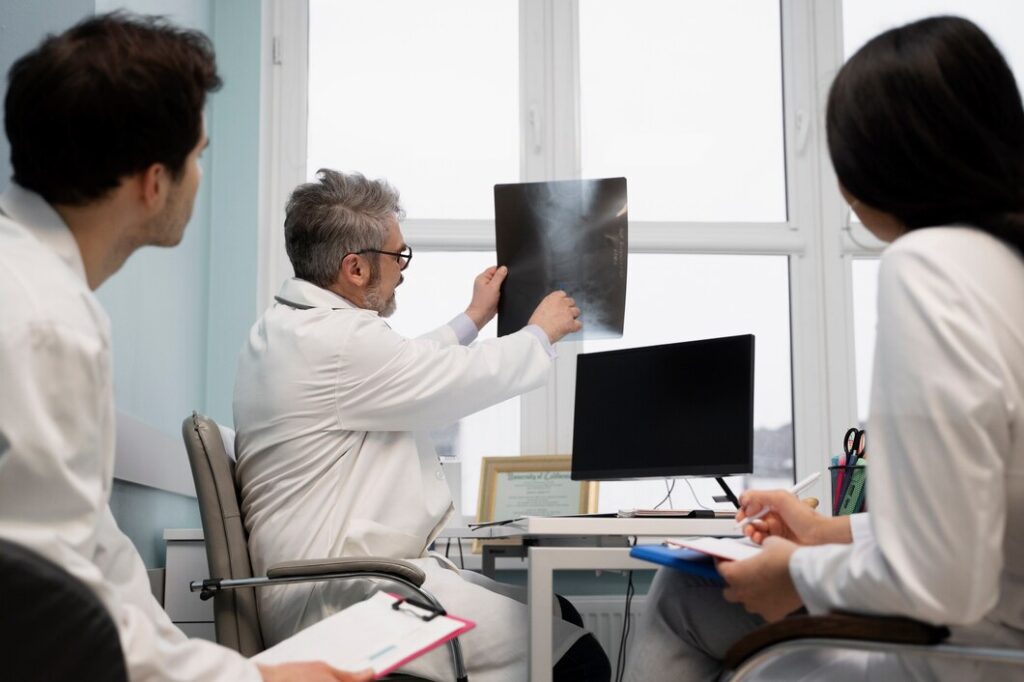Ankylosing Spondylitis in Wilmington - Rheumatology Center of Delaware
We offer the latest quality, state of the art medical care yet in a personable setting. We aim to meld the cutting edge specialist medical care that our clients expect in a comfortable family-oriented atmosphere.
Ankylosing Spondylitis Disease: Understanding the Symptoms, and Treatment Options
Ankylosing spondylitis (AS) is a chronic Inflammatory condition primarily affecting the spine and sacroiliac joints. It can cause severe pain and stiffness, leading to a significant reduction in quality of life. The disease is most commonly seen in young adults and is characterized by inflammation that can result in fused vertebrae, making movement difficult.
What is Ankylosing Spondylitis?
Ankylosing spondylitis is a form of arthritis that predominantly affects the axial skeleton, which includes the spine and the sacroiliac joints. The condition causes the vertebrae to fuse together, leading to a loss of spinal flexibility. This fusion can result in severe back pain and stiffness.
Develop Ankylosing Spondylitis: How It Happens
The exact cause of ankylosing spondylitis is not fully understood. However, it is thought to be an autoimmune disorder where the immune system mistakenly attacks the joints. Inflammation starts in the sacroiliac joints, which can gradually spread to other areas of the spine and peripheral joints.
Risk Factors for Ankylosing Spondylitis
Several factors can increase the risk of developing ankylosing spondylitis. The primary risk factor is genetics, with the HLA-B27 gene playing a significant role in susceptibility to the disease. Additionally, men are more likely to develop AS than women, and it typically starts in early adulthood.
SIGNS/SYMPTOMS
-
Chronic Lower Back Pain: Persistent pain and stiffness in the lower back, especially in the morning or after periods of inactivity.
-
Reduced Flexibility: Gradual loss of flexibility in the spine, leading to a hunched posture over time.
-
Pain in the Hips or Shoulders: Inflammation may also affect the hips, shoulders, and other joints.
-
Morning Stiffness: Joint stiffness in the morning or after sitting for long periods, improving with movement.
-
Pain Relief with Exercise: Symptoms often improve with regular physical activity and movement.
-
Fatigue: Chronic tiredness and lack of energy, which is common in people with ankylosing spondylitis.
-
Inflammation of the Heel: Pain or swelling in the heel due to inflammation in the tendons and ligaments.
LIVING WITH ANKYLOSING SPONDYLITIS
Stay Active: Regular low-impact exercises, like swimming or walking, can help improve mobility and reduce stiffness.
Maintain Good Posture: Practice proper posture to prevent spine curving and maintain alignment, helping reduce pain.
Manage Pain with Medication: Use prescribed medications like NSAIDs or biologics to manage pain and inflammation effectively.
Use Heat and Cold Therapy: Applying heat or cold packs can help soothe sore joints and reduce inflammation.
Focus on Strengthening Muscles: Strengthening core and back muscles through physical therapy or exercise can support the spine.
Get Quality Sleep: Prioritize rest to allow your body to recover, which can help alleviate fatigue and improve overall health.
Adapt Your Environment: Make modifications in your home or workspace to reduce strain on joints, such as using supportive chairs or standing desks.
Inflammatory Disease and its Impact on the Body
Ankylosing spondylitis is an inflammatory disease, meaning that the immune system causes the body’s tissues to become inflamed. Chronic inflammation in the joints and spine can lead to pain and, over time, to the fusion of the vertebrae, limiting movement and flexibility.
Severe Pain and Discomfort
One of the hallmark symptoms of ankylosing spondylitis is severe pain. This pain typically worsens after long periods of rest, such as sleeping at night or sitting for long periods. Physical therapy and medication can help manage this pain and improve mobility.
Other Treatment Approaches for AS
In addition to medications and physical therapy, other treatment approaches may be helpful in managing ankylosing spondylitis. These include complementary therapies such as acupuncture and yoga, as well as lifestyle changes like weight management and smoking cessation.
Preventing Complications of Ankylosing Spondylitis
Preventing complications of ankylosing spondylitis is essential for maintaining long-term health. This includes monitoring for vertebral fractures, eye inflammation, and cardiovascular issues. Early intervention can help prevent permanent damage to the joints and other parts of the body.
OUR MEDICAL CLINIC SERVICES IN WILMINGTON, DELAWARE
WILMINGTON SPECIALIZE IN RHEUMATOLOGY AND INFUSION THERAPY
Our Wilmington facility is committed to providing expert care in rheumatology and infusion therapy. Specializing in the treatment of complex autoimmune and inflammatory conditions, we deliver personalized diagnosis and management to meet your unique healthcare needs. Utilizing state-of-the-art medical technology, our infusion therapy services ensure the safe and effective administration of treatments in a comfortable and professional setting. Trust Wilmington’s dedicated team of specialists to deliver compassionate, high-quality care focused on improving your health and overall well-being.
Rheumatoid Arthritis
Crohn’s
Osteoarthritis
Psoriasis and
Psoriatic Arthritis
Systemic Lupus
Ulcerative colitis
Joint injections
Connective
tissue disease
Osteoporosis
Temporal arteritis
Vasculitis
Generalized
joint pain
Ankylosing Spondylitis
Gout
Fibromyalgia
Polymyalgia
rheumatica
Rheumatoid Arthritis
Crohn’s
Osteoarthritis
Psoriasis and
Psoriatic Arthritis
Systemic Lupus
Ulcerative colitis
Joint injections
Connective
tissue disease
Osteoporosis
Temporal arteritis
Vasculitis
Generalized
joint pain
Ankylosing Spondylitis
Gout
Fibromyalgia
Polymyalgia
rheumatica
Areas Rheumatology Center of Delaware Cares
Wilmington
Wilmington facility is committed to providing expert care in...
Dover
Dover Urgent Care offers prompt medical attention for...
Milford
Milford facility is dedicated to providing specialized care in...
Areas Rheumatology Center of Delaware Cares
Wilmington
Wilmington facility is committed to providing expert care in...
Dover
Dover Urgent Care offers prompt medical attention for...
Wilmington
Milford facility is dedicated to providing specialized care in...
RHEUMATOLOGY CENTER OF DELAWARE FAQs ABOUT ANKYLOSING SPONDYLITIS
What is ankylosing spondylitis?
Ankylosing spondylitis is a type of inflammatory arthritis that primarily affects the spine, causing pain, stiffness, and in some cases, fusion of the vertebrae.
What are the common symptoms of ankylosing spondylitis?
Common symptoms include chronic lower back pain, reduced flexibility, morning stiffness, and pain in the hips or shoulders.
What causes ankylosing spondylitis?
The exact cause is unknown, but genetics play a key role, with the presence of the HLA-B27 gene increasing the risk of developing the condition.
How is ankylosing spondylitis treated?
Treatment typically includes medications (like NSAIDs, biologics, or DMARDs), physical therapy, and lifestyle changes like regular exercise.
Can ankylosing spondylitis affect other parts of the body?
Yes, in addition to the spine, ankylosing spondylitis can affect other joints, the eyes (uveitis), and occasionally the heart and lungs.
How can I manage ankylosing spondylitis symptoms?
Regular exercise, maintaining good posture, using heat or cold therapy, managing stress, and adhering to prescribed treatments can help manage symptoms.


Managing Back Pain with Ankylosing Spondylitis
Back pain is one of the most challenging symptoms of ankylosing spondylitis. Treatment options include medication, physical therapy, and heat or cold therapy. Maintaining good posture and staying active can also help reduce back pain.
Contact Information
- 302-994-2345
- 4512 Kirkwood Hwy Wilmington, DE 19808, USA
Get Up Close with Wildlife at Brandywine Zoo
Visit the Brandywine Zoo, a small, family-friendly zoo located in Brandywine Park, home to both native and exotic species. It’s the perfect destination for animal lovers of all ages to explore and learn about wildlife in a fun and engaging setting.
At the Rheumatology Center in Wilmington, Delaware, we offer expert care for managing ankylosing spondylitis. Our dedicated team works with you to develop personalized treatment plans aimed at reducing inflammation, improving flexibility, and enhancing your quality of life. With advanced therapies and ongoing support, we’re here to help you regain control of your health and live an active, pain-free life. Don’t wait schedule a consultation today and start your journey toward better health.







